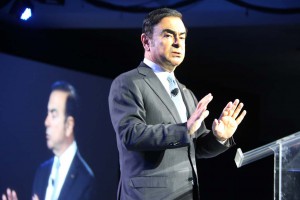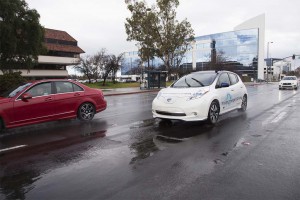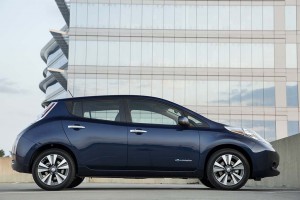Already the world’s number one producer of battery-electric vehicles, Japan’s Nissan and its French alliance partner Renault intend to become the leader in autonomous driving, as well – CEO Carlos Ghosn telling a New York International Auto Show audience the partners intend to offer 10 vehicles with “significant autonomous drive functionality” by 2020.
According to Ghosn, the Renault-Nissan Alliance will begin to roll out increasingly advanced version of its technology over the next four years, starting with cars capable of operating hands-free in a single lane on limited-access highways. The next step will allow vehicles to pass and change lanes, with the alliance’s first, fully autonomous car set to go into production by 2020.
“This is not a time to be conservative or cautious” about changing technology, said Ghosn, who added that traditional automakers face a series of potential challenges, some posed by an assortment of outside tech companies like Google and Apple.
(Live from NY! Keep up on all the breaking news for the NY Auto Show. Click Here.)
Nissan is by no means the only automaker getting into the autonomous field. And many experts believe that Google has the most advanced development program. But it has yet to make clear how it plans to go to market. The Silicon Valley giant has more than enough cash to set up a car manufacturing operation or, for that matter, to buy an established automaker, though it has so far shown no interest of going that route.
There are plenty of questions being raised by all the changes sweeping through the auto industry, noted Ghosn, who declared, “The future is not clear.”
Among the big questions is how alternative mobility programs will develop. U.S. automakers General Motors and Ford, as well as German manufacturers Daimler AG and BMW, have been investing heavily in car-sharing and ride-sharing programs. GM, for example, announced it would pump $500 million into taxi alternative Lyft, while setting up its own vehicle-sharing service Maven.
For his part, Ghosn admitted Renault and Nissan have been slow to embrace these alternatives. “We’re a little skeptical about how much (car- and ride-sharing) will grow,” the Brazilian-born executive said during one of several auto show appearances. “We have a little doubt about how big a share of the industry these will be.”
(Nissan GT-R gets more power, tech, new look. Click Here for more.)
One thing Ghosn said he is certain about is the future of the electric vehicle. There is “no way” to meet the global warming goals world leaders agreed to in Paris last year – never mind increasingly tough emissions and mileage standards – without the use of more and more hybrids, plug-ins and pure battery-electric vehicles.
The challenge, he said, is bringing down costs and taking the other steps necessary to take battery technology mainstream.
“Electrifying a few high-end cars, what difference will that make for emissions?” he asked his audience during a media roundtable. “We have to go for the numbers.”
While Nissan’s Leaf is the world’s best-selling electric vehicle, demand for battery cars of all forms slipped in 2015. Cheap gas was clearly one reason. But there are other factors that have delayed mass adoption, cautioned Ghosn, admitting, “We probably underestimated the reluctance of people to jump into electric cars because of a lack of (a charging) infrastructure.”
Like his counterparts elsewhere in the industry, Ghosn sees the likelihood that electric propulsion and autonomous driving will be paired on many of the same vehicles in the years ahead.
While conceding it’s hard to be sure how many of the challenges facing the industry will shake out in the coming years, Ghosn made it clear he sees the need to be even more aggressive going forward.
“This is not a time to be conservative or cautious,” he stressed, insisting that “Opportunities have never been greater” for those companies willing to take risks.
(Infiniti introduces QX70 Limited at NY Auto Show. Click Here to check it out.)



